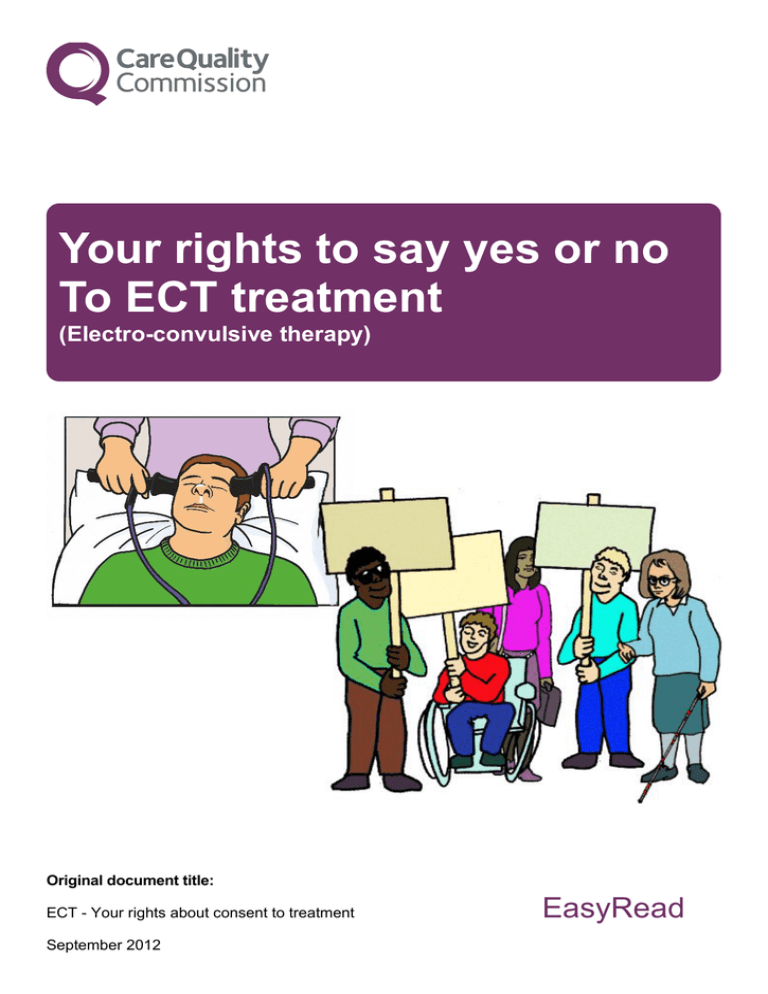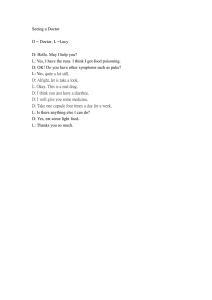Your rights to say yes or no to ECT
advertisement

Your rights to say yes or no To ECT treatment (Electro-convulsive therapy) Original document title: ECT - Your rights about consent to treatment September 2012 EasyRead What is in this guide? page About the Care Quality Commission .......................................1 What is ECT ....................................... 2 Your rights to say yes or no............ 4 The second doctor (sometimes called SOAD)................................................. 6 How to contact us.............................. 10 How to complain ............................... 12 What is in this guide? page How to talk to a Mental Health Act Commissioner ................................... 18 For more information ........................19 How to contact us ............................. 20 About the Care Quality Commission The Care Quality Commission is independent – this means we are not part of the Government. We make sure people in England get better health and social care services. We check services for people who are being treated under a law called the Mental Health Act. We make sure everyone uses this law properly for people who need: ● to be kept in hospital ● treatment in the community ● someone to make decisions for them and make sure they get treatment. 1 What is ECT? ECT is short for electro-convulsive therapy. It is sometimes used to treat some mental illnesses. If your doctor thinks it will help you to have ECT they will explain: ● what it is ● why they think you should have it. This leaflet explains your rights to say yes or no to this treatment. 2 Your rights to say yes or no Before you can be given ECT, your doctor will ask if you want it. You can say no if you do not want it. If you need someone to help you decide, or speak up for you, ask for an advocate You might have written it down in the past saying you did not ever want ECT. This needs to be signed by you and a witness.You can also change your mind. But it is best to talk to your doctor first. Sometimes, even if you have done this, your doctor can still give you ECT in an emergency, like trying to save your life. But this is very rare. 3 If you are unable to say what you want: ● your doctor must tell the Care Quality Commission ● we will ask another doctor to see you who is separate from the hospital ● your doctor cannot give you ECT unless this second doctor agrees you need it. People under 18 years old can only ever be given ECT if their own doctor and a second doctor agree. Doctors do not have to stick to these rules if you need ECT to save your life or to stop you getting much worse. 4 The second doctor (Sometimes called SOAD) If you need to be seen by a second doctor, they will: ● make sure staff are sticking to the law about treating you in hospital or the community ● talk to you about your treatment on your own, unless you would like someone else with you ● speak to your doctor and 2 other people who know about your care, like your nurse ● decide whether ECT is the right treatment for you. The second doctor will tell CQC and your own doctor what they have decided. 5 Your own doctor will tell you what the second doctor has said. Your hospital should arrange for a signer or interpreter if you need one. Independent Mental Health Advocates When you are being kept in hospital you can have an advocate. These are called Independent Mental Health Advocates. These are people who can help you find out more about your rights. If you would like to talk to an advocate please ask a member of staff. If you would like to talk to an Independent Mental Health Advocate please speak to your treating team. 6 Staff can give you 2 of our leaflets that tell you how to complain about your care or treatment. They tell you how we support the rights of people: ● who are being kept in hospital ● being made to have treatment in the community. ECT 7 You can also find these leaflets on our website www.cqc.org.uk You can ask to speak to one of our Mental Health Act Commissioners. These are the people who check services for people who are being treated under the Mental Health Act. Or make a complaint about your care or treatment under the law. You can also tell us what you thought of the service on our website www.cqc.org.uk 8 How to contact us You can contact us if you, a friend or family member want to: ● talk to one of our Mental Health Act Commissioners. These are the people who check services for people who are being treated under the Mental Health Act ● complain about your care or treatment ● find out more about what we do. Write to: CQC Mental Health Act Citygate Gallowgate Newcastle upon Tyne NE1 4PA Call us on: 03000 61 61 61 Choose option 1 when you are asked. Or leave a message if we are closed and we will ring you back. 9 There will be a message machine on if the office is closed. Please make sure you tell us your name and number so we can call you back when the office opens. If you do not like answer phones call during the day or get someone else to call for you. If you would like this information in a different language or format, please go to our website or call: 03000 61 61 61 10 Making a complaint We have published two other booklets that explain what to do if you want to make a complaint about something which happened during your care and treatment under the Mental Health Act: Rights of people who are detained How we support the rights and interests of people who are detained in hospital. version of: care EasyRead lth This is the plain about a hea “How to com service.” care or social CTO information How we support the rights and interests of people on a Community Treatment Order (CTO) version of: care EasyRead lth This is the plain about a hea com “How to ice.” care serv or social If you would like to see a copy of the booklet that applies to you, ask the ward staff or community care staff or go to our website at www.cqc.org.uk 11 Where we are The Care Quality Commission's head office is at CQC Mental Health Act Citygate Gallowgate Newcastle upon Tyne NE1 4PA How to contact us Phone: 03000 616161 option 1 (calls charged at normal rates) Email: MHAEnquiries@cqc.org.uk Please contact us if you would like a summary of this publication in other formats or languages. Artwork includes material from the Inspired EasyRead Collection and cannot be used anywhere else without written permission. www.inspired.pics 12





